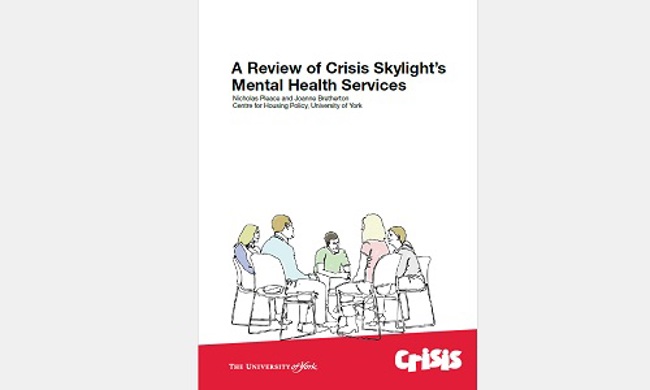Review of Crisis Skylight’s Mental Health Services (2013)
16.03.2013
This independent research commends the mental health services at Crisis for enhancing well-being and helping homeless people towards work and social integration.
Key findings
Crisis Skylight services are designed to promote the social integration of single homeless people with the goal of transforming their social and economic position. Mental health coordinators, funded by the Department of Health, have been placed in four Crisis Skylight services to enhance service provision for single homeless people with mental health problems.
The mental health coordinators have enhanced access to health and social services, improved access to counselling and also assisted the social integration of single homeless people with mental health problems. The coordinators have also provided significant direct support, in the form of one-to-one support sessions, group based activities and service user forums to
provide direct feedback about services.
- Mental health coordinators were improving service provision for single homeless people with mental health problems. The coordinators reported that people who had experienced barriers to mainstream
services due to homelessness were using the Skylights and engaging with the services provided and arranged by those coordinators. There was direct evidence
from focus groups conducted with service users that access to NHS, social services and other forms of support had been enhanced by the coordinators. - Service users reported that the coordinators and the wider Skylight services created tolerant, understanding services in which they did not feel stigmatised by their mental
health problems or their experiences of homelessness. There was some evidence from the focus groups that service users could get a better understanding of
their mental illness through working with coordinators. - Service users participating in focus groups generally felt listened to, there was also statistical evidence of participation in service user forums.
- There was direct evidence of access to counselling services being provided via the mental health coordinators, combined with the enhancements in access to NHS and social services reported above.
- Partnership working had been extensively developed by the coordinators. These arrangements could work well, although resource issues could sometimes influence the capacity of other agencies to respond.
- There was evidence that the coordinators could directly enhance the well-being of homeless people with mental health problems and also improve their access to counselling and NHS services. The coordinators also facilitated and supported access to the wide range of meaningful activity, education, training and work related programmes offered by the wider Skylight teams of which they were a part.
- There was evidence that working with Skylights had helped people with a history of homelessness and mental health problems into paid work. Ninety people had secured full and part time work as a result of engaging with a Skylight service (14% of service users). Six per cent of service users were in employment at first contact with a Skylight service.
- There is evidence that an innovative and accessible service model has been developed in the provision of mental health coordinators within Skylight teams and a clear case for expansion of the mental health coordinator service model.
Reference
Pleace, N. & Bretherton, J. (2013) A Review of Crisis Skylight's Mental Health Services. York: University of York.

